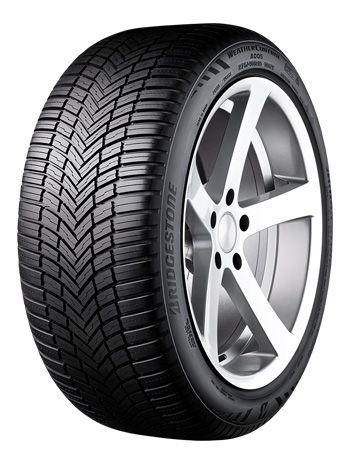All season tyres or all weather or multi-season tyres are ideal for countries with less extreme seasonal weather conditions, where winters are likely to be cold & wet rather than a high degree of snow, as such they are ideal for the UK. These tyres use a compound which has a broader operating temperature range, larger tread blocks like a summer tyre but also side snipes like a winter tyre. While an all-season tyre is a compromise and unlikely to meet the peak performance standards of either a winter or a summer tyre in their respective seasons, they represent a very good all-round alternative offering better cold weather performance than a summer tyre in winter and better summer performance than a winter tyre in summer. Many all-season tyres are approved for use in winter conditions and carry the designated snowflake and mountain symbol on their sidewall.

Summer Tyres – The compound of material used in the construction of the tyre (often referred to as rubber) tends to work more efficiently over 7 degrees centigrade resulting in a tyre which is more responsive in cornering and braking in both wet and dry conditions. In the UK these are the most common seasonal tyre types because our weather tends to be generally mild, for the most part the average temperature in the uk only drops below 7 degrees in December, January & February and for a limited number of days. However, this will depend upon many factors such as the severity of the UK winter, which part of the UK you live in and of course the time of day.
Winter tyres – The tyre compound in winter tyres tends to be of a softer construction and works most efficiently in temperatures below 7 degrees C. The tread of a winter tyre is most likely to have deeper grooved sipes specifically designed to channel away water and bite into snow and ice in order to maximise the contact patch between tyre and road surface. Winter tyres, or more accurately cold weather tyres provide better grip and traction as well as better braking in both dry and wet weather conditions at temperatures below 7 degrees but in general do not perform as well as summer tyres in temperatures above 7 degrees C and their tread will most likely wear out quicker in warmer temperatures. In many countries which experience a more extreme climate, many parts of Northern Europe for example it is a requirement of the law that drivers maintain both a summer and winter set of tyre and wheels. A winter tyre will be marked as such on its side wall by a snowflake and mountain symbol.
ETB Autocentres carry many all-season tyres including
Bridgestone Weather Control A005 :- https://www.etbtyres.co.uk/bridgestone-a005/
Michelin Cross Climate, Firestone multi-season & Landsail 4- seasons
Calls may be recorded for training and to ensure the best quality customer service.
TYRE BRANDS
Bridgestone - Firestone - Avon - Michelin - Pirelli - Continental - Davanti - Ceat